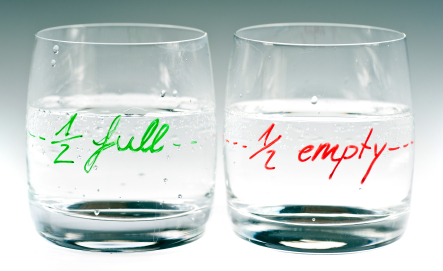Ever get caught in negative thoughts? This is the first of two posts where we explain why positivity matters and share some tips on how to deal with negative thoughts to develop more positivity in your day.
In our busy day to day lives, our mind wonders of frequently in to distracting thoughts. It can simply be about our shopping list, our next business meeting or a crucial conversation we had yesterday. Sometimes these thoughts turn negative in to worrying about the future, ruminating about the past, or criticising ourselves or our lives. We are what we think and therefor too many negative thoughts can have a significant impact on our behaviour and our lives.
Martin Seligman, pioneer of the positive psychology movement, believes there are two type of people; positive and negative ones. He has done masses of research over the last decades and has gathered evidence of the significance of being positive.
In his book Learned Optimism he describes how compared to negative people, positive individuals are more likely to:
- be less depressed: although at any point in time, about 25% of people show some sign of mild depression, positive individuals will minimize the severity and length of a depression.
- live healthier: pessimism influences your immune system and is associated with poor physical health.
- perform better: in one insurance company, the 10% most positive sales-men, sold 88% more insurance policies than the 10% most negative sales-men.
These are compelling reasons to make an effort to see the glass half full more often. The good news, according to Seligman, is that we can actually change our thinking and behaving to increase our positivity.
He mentions that ‘One of the most significant finding in psychology in the last 20 years is that individuals can choose the way they think’. With some practice, we can take control and change our thinking and behavior and become more positive.
“See the positive side, the potential, and make an effort.” – Dalai Lama
What follows are some simple tips and techniques to build more positivity in your day. These are also used as intervention techniques to develop your Mental Toughness. Making these a routine can have great results for your own well-being and performance.
- Thought stopping: if you catch yourself worrying. Simply stop your thoughts, be mindful and focus on the task or activity that you are doing. If you drift back in to worries, gently stop your thoughts and re-focus again.
- Thought replacement: if you catch yourself thinking negatively, replace the negative thought with a positive thought. Your last holiday, the good friend you spoke to yesterday, or simply a beautiful cloud in the sky. Try to swap and find a positive angle in your negative thought.
- Self-affirmations: Affirmations are short statements that mean something to you and can build your self-worth and confidence. World number 1 tennis player Serena Williams uses it, so why not you? Think about what is important to you, what you’re good at or what you have achieved. Using short sentences like ‘I’m a caring person’ or ‘I’m good in what I’m doing’ helps improve your confidence and positivity. Tell yourself whilst you’re brushing your teeth, or like me browse through an affirmation app on your mobile.
- Focused distraction: By concentrating on something else you can you can distract your thoughts from the negative. Try intensely focus on something. The seconds moving on your watch, the scratches on your ring or count every hair on your arm. Last time I used this technique a nurse was taking my blood, which usually makes me faint!
- 3 favorite things: at the end of your day take some time to reflect and name the three favorite things of the day. It creates a positive mindset. Do it together with the family. My kids love it!
As with every change, it will take time, practice and some commitment to include some of these techniques in your daily life. Once you do, you are on your way to create a more positive mindset and increase your Mental Toughness, well-being and performance.

